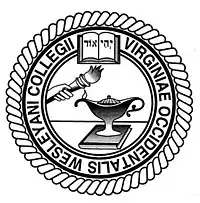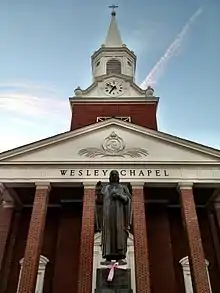 | |
| Latin: Wesleyanum Collegium Virginiae Occidentalis | |
Former name | Wesleyan University of West Virginia (1905–1906) |
|---|---|
| Type | Private college |
| Established | 1890 |
| Accreditation | HLC |
Religious affiliation | United Methodist Church |
Academic affiliations | CIC NAICU IAMSCU |
| Endowment | $42.4 million |
| President | James Moore |
Academic staff | 137 |
| Students | 900 |
| Undergraduates | 824 |
| Postgraduates | 75 |
| Location | , , United States 38°59′19″N 80°13′18″W / 38.98861°N 80.22167°W |
| Campus | Rural |
| Colors | Orange and Black |
| Nickname | Bobcats and Lady Bobcats |
Sporting affiliations | NCAA Division II - MEC |
| Mascot | Bobcat |
| Website | wvwc.edu |
West Virginia Wesleyan College is a private college in Buckhannon, West Virginia. It has an enrollment of about 900 students from 35 U.S. states and 26 countries. The school was founded in 1890 by the West Virginia Conference of the Methodist Episcopal Church and is currently affiliated with the United Methodist Church. West Virginia Wesleyan College is accredited by the Higher Learning Commission.
History
.jpg.webp)
Early history
West Virginia Wesleyan College was founded in 1890 by the West Virginia Annual Conference of the Methodist Episcopal Church. The school opened in 1890, in a new three-story brick building where the current Lynch-Raine Administration Building now stands. Ohio Wesleyan University and Boston University School of Theology alumnus Bennett W. Hutchinson was the college's first president.
Following ten years focusing on college preparatory work, college-level instruction was first offered in 1900 culminating in the first baccalaureate degrees in 1905. For one year the institution was named Wesleyan University of West Virginia but it was quickly changed to West Virginia Wesleyan College in honor of John Wesley, the founder of Methodism. Pre-college instruction continued until 1923 when it was discontinued because the high schools in the state had grown enough to adequately perform that task.
Recent years
Pamela Jubin Balch, a 1971 graduate of Wesleyan, became the college's 18th president in July 2006. Dr. Balch is the first woman to serve as president in the college's history. At the outset of her tenure as President, Balch reinstated the college's briefly-discontinued nursing program as well as its 3-2 engineering program. The college has since expanded its academic programs, adding graduate degrees in athletic training, business administration, English Writing, and nursing.
Academics
The college offers over 50 undergraduate majors and 33 minors. Wesleyan also has 3-2 engineering partnerships with Marshall University and West Virginia University. Undergraduate degrees are awarded in Bachelor of Arts, Bachelor of Science, Bachelor of Science in Nursing, and Bachelor of Music Education. Graduate degrees awarded include the Master of Science in Athletic Training, Master of Business Administration, Master of Fine Arts in Creative Writing, and Master of Science in Nursing.
Approximately 80% of West Virginia Wesleyan's faculty have earned doctorates or comparable terminal degrees within their field. The student-faculty ratio is 14 to 1, with an average class size of 19.
Campus


The campus boasts 23 major buildings of Georgian architecture. The grounds are situated in a park-like setting of more than 100 acres.
Student life
Wesleyan has retained its residential character; about 90% of the students live on campus.
There are 21 NCAA Division II sports teams, and 70 clubs and organizations.
The college's athletics teams are the Bobcats, which compete in the NCAA Division II Mountain East Conference, of which it was a founding member in 2013. The Bobcats were former members of the West Virginia Intercollegiate Athletic Conference (WVIAC), having been recognized as having the top athletic program in the WVIAC.by winning, over 151 conference championships and earning a conference dominance of 18 Commissioner's Cups during the past 20 years and eight Presidents' Cups in 14 years. Each year, Wesleyan's 21 NCAA II teams successfully compete at the regional and national levels.
The Greek system was initiated on campus in 1925, and many fraternities and sororities have been founded since.
Some Wesleyan students participate in community service through the Center for Community Engagement and Leadership Development (CCE).[1][2] Students in the CCE also organized the first collegiate Jump Rope for Heart events in the United States.[3]
Wesleyan traditions
Athletics
The college currently boasts 21 sports, competing in NCAA Division II. The college offers varsity men's sports in baseball, basketball, cross country, football, golf, soccer, swimming, tennis, indoor track and field and outdoor track and field. The college offers varsity women's sports in basketball, cross country, golf, lacrosse, soccer, softball, swimming, tennis, indoor track and field, outdoor track and field and volleyball. The 21st varsity sport, women's lacrosse, formally began competition in the fall of 2010.
Wesley Chapel
With the ability to seat 1,800 people,[4][5] Wesley Chapel annually hosts the West Virginia United Methodist Annual Conference each June.
Notable alumni
- Maggie Anderson (born 1948), poet
- Ken Ash (1901–1979), baseball player
- Chalmers Ault (1900–1979), football player
- William E. Baker (1873–1954), judge
- Pamela Balch, president of West Virginia Wesleyan College
- Len Barnum (1912–1998), football player
- Cliff Battles (1910–1981), football player
- Thomas Bickerton (born 1958), bishop
- Sheriff Blake (1899–1982), baseball player
- Shannon Breen (born 1989), football player
- Jim Brogan (born 1958), basketball player
- Lewis C. Cantley (born 1949), cell biologist
- Ted Cassidy (1932–1979), actor
- Robin Davis (born 1956), jurist
- Ray Dorr (1941–2001), football player
- William Flanagan (1901–1975), football player
- Matt Foreman, activist
- Denise Giardina (born 1951), novelist
- L. J. Hanifan (1879–1932), economist
- John Kellison (1886–1971), football player
- Jason Koon (born 1985), poker player
- Oscar Lambert (1890–1970), athlete
- Jean Lee Latham (1902–1995), writer
- Blanche Lazzell (1878–1956), painter
- Bil Lepp, TV host
- Carl Martin (politician), member of the West Virginia House of Delegates[6]
- John F. McCuskey (born 1947), justice of the Supreme Court of Appeals of West Virginia
- Irene McKinney (1939–2012), poet
- Jim Miller (1908–1965), football player
- Scott Douglas Miller, President of Virginia Wesleyan University
- Ken Moore (1917-2003), American football player, New York Giants
- Greasy Neale (1891–1973), football player
- Daniel Pitt O'Brien (1900–1957), politician
- Roy Earl Parrish (1888–1918), politician[7]
- Okey L. Patteson (1898–1989), politician
- Anthony Peters (born 1983), soccer player
- Nelson Peterson (1913–1990), football player
- Edward G. Rohrbough (1874–1956), politician
- Harry Shriver (1896–1970), baseball player
- Stephen Skinner, politician
- Margaret Smith (born 1952), politician
- David E. Stuart, anthropologist
- Chalmers Tschappat (1896–1958), football player
- Peter D. Weaver (born 1945), bishop
- Lillian Mayfield Wright (1894–1986), poet
References
- ↑ "WV Campus Compact Awards Engagement Honors to West Virginia Wesleyan" (Press release). West Virginia Wesleyan College. March 28, 2013. Archived from the original on May 12, 2014.
- ↑ "West Virginia Wesleyan College Earns Place on National Honor Roll for Community Service" (Press release). West Virginia Wesleyan College. March 8, 2013. Archived from the original on October 20, 2014.
- ↑ "Second Annual Jump Rope for Heart a Success" (Press release). West Virginia Wesleyan College. April 22, 2013. Archived from the original on May 12, 2014.
- ↑ "Weddings". West Virginia Wesleyan College. Retrieved January 27, 2017.
The chapel seats 1800 people and has a complete sound system, grand piano and the largest pipe organ in West Virginia.
- ↑ "125 Things We Love About Wesleyan" (PDF). Sundial. No. Summer/Fall 2015. West Virginia Wesleyan College. p. 18.
67. Wesley Chapel and Martin Religious Center: Wesley Chapel, which is a designated United Methodist historical site, is truly one of the iconic landmarks of Wesleyan's campus. From its 204-foot tall steeple, to its 1,800-person sanctuary, to the classrooms, meeting rooms, and offices in Martin Religious Center, Wesley Chapel stands as the literal, as well as the spiritual, religious and intellectual heart of West Virginia Wesleyan College, just as it was intended to be when it was constructed in 1966.
- ↑ "West Virginia Legislature". www.wvlegislature.gov. Retrieved 2023-08-22.
- ↑ "West Virginia Veterans Memorial - Roy Earl Parrish". West Virginia Archives and History. Retrieved 2023-07-20.
Further reading
- Haught, Thomas W., West Virginia Wesleyan College 1890-1940, Buckhannon, WV: West Virginia Wesleyan College Press, 1940.
- McCuskey, Roy, All Things Work Together for Good to them that Love God, Buckhannon, WV: West Virginia Wesleyan College Press, ca. 1950.
- Miller, Brett T., Our Home Among the Hills: West Virginia Wesleyan's First 125 Years, Virginia Beach, VA: The Donning Company Publishers, 2014.
- Plummer, Kenneth M., A History of West Virginia Wesleyan College, 1890-1965, Buckhannon, WV: West Virginia Wesleyan College Press, 1965.
